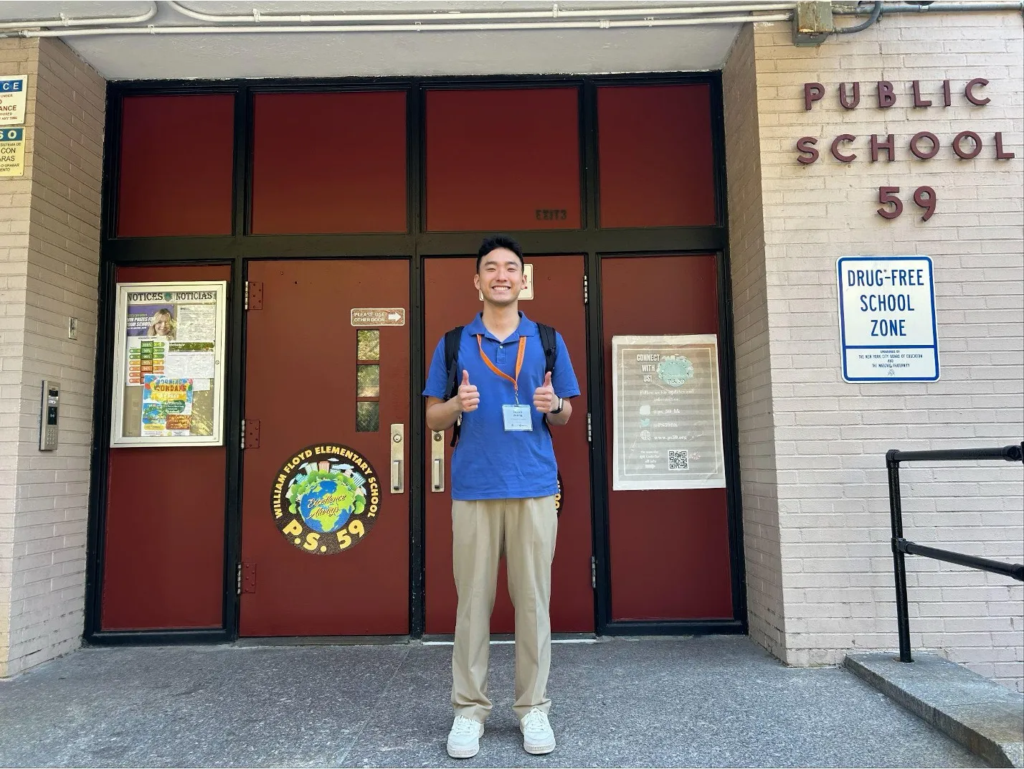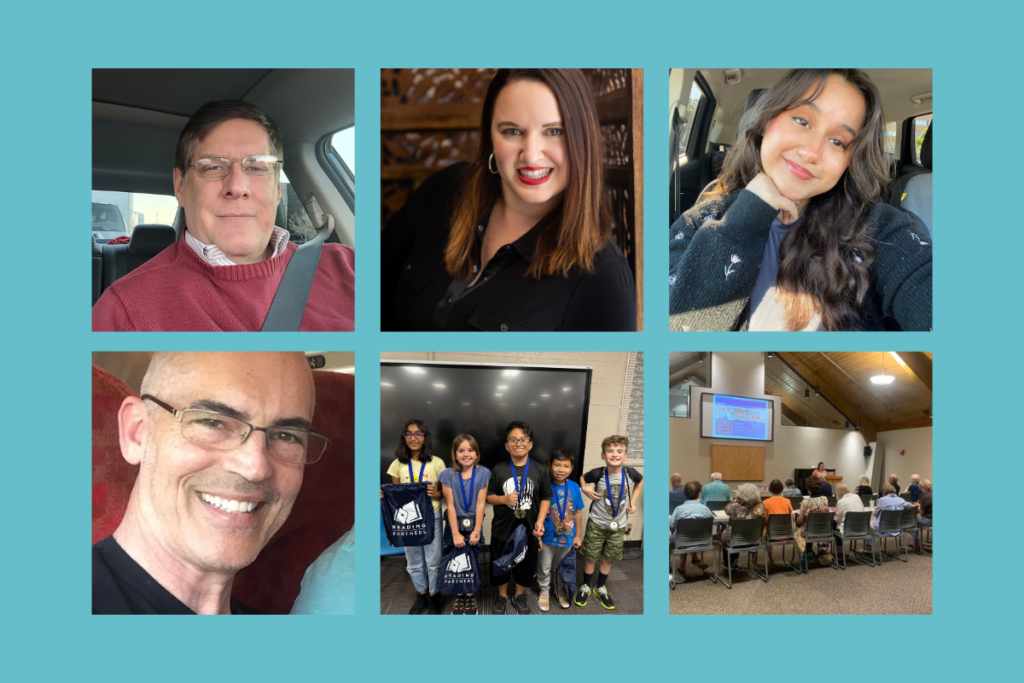
Video in English: interview about Reading Partners
March 9, 2017
Originally published by La Semana del Sur.
William Wynn interviewed Anahi Chavez on February 27, 2017, at Celia Clinton Elementary School concerning her involvement in the Reading Partners volunteer program.
William Wynn: So we’re here at Celia Clinton Elementary with Reading Partners and, Anahi, can you tell me how long you’ve been doing this?
Anahi Chavez: Well, I started in September of 2016 and this is my first year doing Reading Partners. I tutor for like 6 to 8 hours a week and I really love it.
William: Okay. How long have you been working with Lorena?
Anahi: Since about the same time.
William: Okay.
Anahi: I tutor her once a week. It used to be twice a week, or actually just once a week, yeah, but usually on Fridays I’ll do make-up sessions and I help out with kids who were absent.
William: And, Lorena, do you enjoy working with her?
Lorena: (Nods her head.)
William: What’s the best thing about it?
Lorena: Read.
William: You like reading?
Lorena: (Nods her head.)
William: And have you noticed a lot of progress in this time?
Anahi: Yeah. A lot, with all my students, and Lorena actually just started beginning readers, so we’re really excited about that. She was in emerging reading. Now she’s up to beginners.
William: What grade are you in?
Lorena: First.
William: How old are you?
Lorena: Seven.
William: Seven? Wow. And you work with more than one student?
Anahi: Yes, I work with… let me see, I have to count. Five students regularly, and then like I said on Friday…
William: What inspired you to get involved in [this program]?
Anahi: I found out about this through VolunteerMatch.org and I know it really helps out a kid to have someone to look up to with reading. I know it helped me when I was little. You know, I would see the “big kids,” you know, come in from high school or college and just help us out, to learn how to read and that made me think, it’s my time to give back.
William: What kind of books do you like to read?
Lorena: Um, princess.
William: Princess books?
Lorena: (Nods her head.)
William: Yeah?
Lorena: And [dragons?]
Anahi: Dogs?
Lorena: [Bears?]
William: Do you have kids with different, obviously with different, where they’re starting at, in their abilities?
Anahi: Yeah. They’re beginning with ERs, they’re emerging readers, or beginning readers. I actually have a student right now that’s in comprehensive reading, and it’s just awesome to see where they start and where they have their progress. It’s honestly really cool to see all of that.
William: Are some of your kids, I’m guessing here, maybe not native English speakers?
Anahi: Yeah, the majority I tutor are Hispanic and it really helps them that you’re bilingual because they feel comfortable. Some of my students, I told them, “So how many languages do you guys speak?” And they go, “I speak two.” And I’m like, “Which ones?” And they say, “English and Spanish.” And I’m like, “Me, too!” And then, right away, it’s that “click.” So, it really does help to be bilingual.
William: And do you focus on, you’ll be reading one book at a time, and move to another?
Anahi: Yeah, we read one book per session and, like, for her to read aloud, and if we don’t finish that book, we’ll finish it the next session. But each session has a book that’s part of the lesson, that actually goes with the lesson plan. Like, today we learned the sound for “c” and so that book will mainly have words with “c” or words with “ing,” depending on what the lesson is.
William: Okay. Do the students ever bring books to you that they want to read that may not be part of the plan itself?
Anahi: They haven’t yet. I haven’t even thought of that. That’s a good idea. They do enjoy the book reports that they bring to their house. One of my students told me that she has a library going on because of all the books she can take home and they don’t have to bring it back, they just keep it. So, it’s part of their own little personal library.
William: And what book are you reading right now?
Lorena: [?]
Anahi: I think it was like, “Froggy’s first time swimming.” Something like that.
William: Okay.
Anahi: There’re so many books we’ve read. Yeah we read Stellaluna a couple of weeks ago, and she loved it.
William: So, what would you say to other people who might be considering volunteering?
Anahi: First of all, “Do, it.”
William: Yeah?
Anahi: It really does help students out. Just one hour a week really does help. I know that students that don’t read at proficiency level by third grade have a four times higher chance of dropping out, so that alone should make people really want to make sure that the kids in the community are succeeding. So, I love it.
William: Yeah.
Anahi: This actually made me change my major to speech pathology because I kind of learned about it. It was going towards teaching and then I learned about speech pathology, so you learn a lot about kids and how they work, how they are. It’s really rewarding just to see how they progress.
William: Are there moments when you see that something is really clicking that may not have been before?
Anahi: Oh, yeah. I feel like every lesson, there’s one little moment, especially when you walk to get the student from their classroom: “Hey, how’s your day going?” “It’s going good.” They tell you about their family, their lunch, their time at recess. So, it’s not just, “Hey, let’s sit down and do a lesson, let’s get this over with.” You actually have a communication with the student and a bond. Like my student Lorena, when I go to pick her up now, she’ll want to hold my hand. She’s so cute. But, there is a special bond, I feel like, for sure. And I talk to them about college, and then they want to learn more about it. College classes sound like it’s something big.
William: Well, thank you very much.
Anahi: Yeah, you’re welcome.
Elizabeth Brands Vereecke (Executive Director of Reading Partners in Tulsa): Most of our volunteers, we ask our volunteers to volunteer for one hour per week, so it’s a pretty exceptional volunteer when they’re here for more than one hour, or even up to five, that’s pretty extraordinary. So, this is a really special situation. So, thank you so much.



